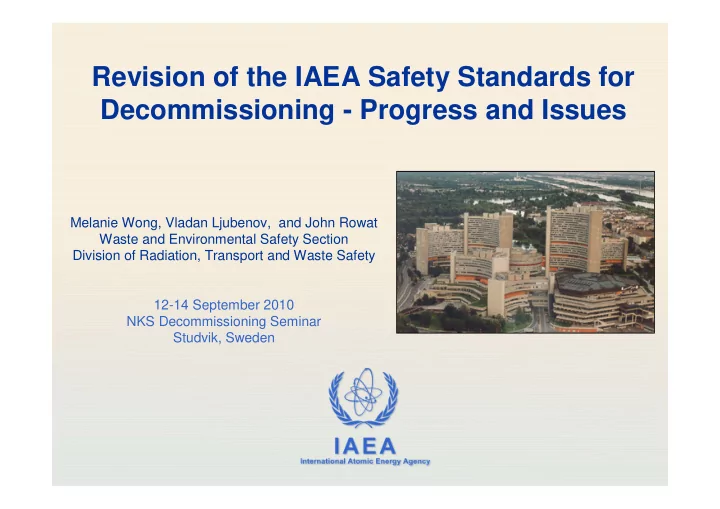

Revision of the IAEA Safety Standards for Decommissioning - Progress and Issues Melanie Wong, Vladan Ljubenov, and John Rowat Waste and Environmental Safety Section Division of Radiation, Transport and Waste Safety 12-14 September 2010 NKS Decommissioning Seminar Studvik, Sweden IAEA International Atomic Energy Agency
Agenda • Background • Current decommissioning safety standards • Other publications that complement these safety standards • Proposed changes to decommissioning safety standards • Challenges related to revising these safety standards and reports • Application of the safety standards • Summary IAEA 2
Background: Mandate Article III Para A.6. The Agency is authorized to establish or adopt … standards of safety for protection of health and minimization of danger to life and property, and to provide for the application of these standards …” Article VIII The agency shall take positive steps to encourage the exchange among its members of information relating to the nature and peaceful uses of atomic energy and shall serve as an intermediary among its members for this purpose. *****The IAEA is bound by statute to apply the safety standards to work carried out with IAEA funds. IAEA 3 3
Background: History of the Programme • 1957: IAEA created. • 1973: IAEA/NEA consultancy on decommissioning • Late 1980s: Radioactive Waste Safety Standards (RADWASS) Programme established. • 1996 (January): Department of Nuclear Safety and Security created . IAEA 4 4
Background: IAEA International Safety Documents Safety Standards: Fundamentals, Requirements, and Guides Technical support documents Reviews, Assessments, and Intercomparisons IAEA 5
Safety Standards: Fundamental Safety Principles • Basic objectives, concepts and principles involved in ensuring protection and safety • Fundamental safety objective and the10 principles to be applied to achieve the fundamental objective IAEA 6 6
Safety Standards: Safety Requirements 2006 • Basic objectives and concepts of Safety Fundamentals as they apply to a specific activity or facility IAEA 7 7
Safety Standards: Current Decommissioning Safety Guides 1999 1999 2001 IAEA 8
Other IAEA Safety Standards 2004 2006 2008 IAEA 9 9
Safety Report Series • Support IAEA Safety Standards • Decommissioning Safety Reports include: 1. Decommissioning Strategies for Facilities Using Radioactive Material, IAEA Safety Reports Series No. 50 (2007) 2. Standard Format and Content for Safety Related Decommissioning Documents, IAEA Safety Reports Series No. 45 (2005) 3. Safety Considerations in the Transition from Operation to Decommissioning of Nuclear Facilities, IAEA Safety Reports Series No. 36 (2004) 4. Safe Enclosure of Nuclear Facilities During Deferred Dismantling, IAEA Safety Reports Series No. 26 (2002) IAEA 10 10
Division of Nuclear Fuel Cycle and Waste Technology Publications • Additional Guidance available at: http://www.iaea.org/OurWork/ST/NE/NEFW/wts_decommissioning_home.html • Decommissioning publications are organised according to major themes such as: 1. Technology 2. Management 3. Implementation 4. Development 5. Special Topics 6. Draft Documents IAEA 11 11
Revisions of the Safety Standards • IAEA Review Cycle 1. Requirements: 10 year cycle (2006) 2. Safety Guides: 5 year cycle (1999 and 2001) IAEA 12 12
Revisions of the Safety Standards (cont’d) • Review and revise the existing safety guides 1. Reflect the new Safety Fundamentals (SF-1) 2. Reflect the new Safety Requirements (WS-R-5) 3. Reflect the outcomes of Athens conference and feedback from standards application 4. Incorporate recent experience and good practice 5. Provide up-to-date detailed practical guidance to regulators, operators and other technical support organisations IAEA 13
Revision of the Safety Standards (cont’d) 1999 2001 1999 2006 DS402 DS404 DS403 Decommissioning of Naturally Occuring Radioactive Material Combine Related Facilities Under revision Proposed New Safety Guide IAEA 14
Revisions of the Safety Standards (cont’d) • Comment on published standards through the IAEA website. • Download drafts and comment: 1. Web page at: www-ns.iaea.org/standards/standards/ 2. Click on “Draft Standards listed by number” 3. Click on “Standards Feedback ” IAEA 15 15
Further Information on Decommissioning Safety Documents http://goto.iaea.org/decommissioning IAEA 16
Application of the Safety Standards 1. Iraq Decommissioning Programme TAMMUZ-2 Research Test Reactor IRT-5000 Reactor IAEA 17
Application of the Safety Standards (cont’d) 2. Research Reactor Decommissioning Demonstration Project (R2D2P) Demonstrate all phases of a typical decommissioning project HIFAR Reactor, ANSTO Australia PRR-1, PNRI Philippines IAEA 18
Application of the Safety Standards (cont’d) Fuel fabrication facility 3. FaSa (2008 -2011) Nuclear power plant Application, implementation, updating and evolution of safety assessments in the development and review of Mining and milling facility decommissioning plans Research reactor IAEA 19
Conclusion • IAEA’s safety standards underpins a global approach to radiation safety • Guidance is available to assist users to achieve high level of safety in the area of decommissioning • Several Safety Standards are undergoing revisions • Your participation is appreciated during the development of these Safety Standards • IAEA continues to apply these Safety Standards by providing targeted assistance to the Member States. IAEA 20 20
Thank you for your time and attention. IAEA 21 21
Recommend
More recommend